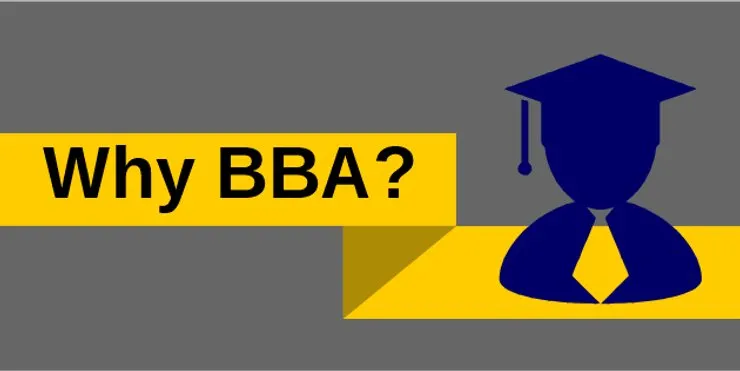Introduction to BBA

In today’s fast-paced world, business education has become one of the most sought-after fields. The BBA program is a top choice for students who aspire to build a strong foundation in business and management. It is a professional undergraduate course that opens up a world of opportunities in corporate, entrepreneurship, and higher education. The BBA program provides a perfect blend of theoretical knowledge and practical business skills, preparing students to become future business leaders and entrepreneurs.
The BBA is a three-year degree program, usually divided into six semesters. It covers various aspects of business management, including marketing, finance, human resource management, operations, entrepreneurship, and strategic management. It is one of the most popular choices among students from commerce and even non-commerce backgrounds who wish to build a career in business and corporate management.
Why Choose Bachelor of Business Administration?

The program is an ideal course for students who want to gain a comprehensive understanding of business operations. Unlike traditional degree courses, the BBA focuses on practical learning through case studies, presentations, internships, and industry exposure. It helps students develop key management skills such as decision-making, problem-solving, communication, leadership, and teamwork.
One of the biggest advantages of pursuing THIS PROGRAM is its versatility. Students can choose to work in multiple sectors such as marketing, finance, banking, retail, e-commerce, education, or even start their own business. The course is structured in a way that grooms students to take up managerial roles at an early stage of their careers.
BBA
The course is divided into six semesters, with a wide range of core and elective subjects. In the first year, students are introduced to foundational subjects such as Principles of Management, Business Economics, Business Mathematics, and Financial Accounting. These subjects lay the groundwork for understanding how businesses function.
In the second and third years of the Bachelor of Business Administration, students explore more specialized topics like Marketing Management, Human Resource Management, Financial Management, Organizational Behavior, and Business Law. Elective subjects and project work are also introduced in the later semesters to allow students to explore areas of interest.
Most colleges offering BBA also provide internship opportunities, allowing students to gain real-world exposure. Some universities even include industry projects and live case studies as part of their curriculum, ensuring students graduate with hands-on experience.
Eligibility Criteria for BBA

To pursue a BBA Bachelor of Business Administration, students must have completed their 10+2 education from a recognized board. While some universities require a minimum percentage (usually 50-60%), others conduct entrance exams to shortlist candidates. There are no strict subject requirements, making the BBA accessible to students from science, commerce, and arts streams.
Some popular entrance exams for programs include IPMAT, CUET, SET (Symbiosis), NPAT (Narsee Monjee), and DU JAT (for Delhi University). These exams generally test aptitude, logical reasoning, quantitative skills, and English proficiency.
Top Colleges Offering BBA in India
Several prestigious institutions across India offer the BBA program. Some of the top colleges include:
Shaheed Sukhdev College of Business Studies (Delhi University)
Christ University, Bangalore
NMIMS (Mumbai, Navi Mumbai, Bengaluru)
Symbiosis Centre for Management Studies (SCMS), Pune
Amity University
Loyola College, Chennai
JIMS (Rohini, Kalkaji), Delhi
GGSIPU affiliated colleges like VIPS, Maharaja Agrasen, and Maharaja Surajmal
These colleges are known for their quality education, experienced faculty, and strong placement records in the BBA Bachelor of Business Administration domain.
Career Opportunities After BBA

The degree opens up a wide range of career opportunities. Students can find entry-level roles in sales, marketing, finance, HR, customer relationship management, banking, insurance, and consultancy. Popular job role BBA graduates include:
Marketing Executive
Business Development Executive
HR Executive
Financial Analyst
Operations Manager
Sales Manager
Digital Marketing Executive
Many students who complete the COURSE go on to work for leading MNCs, startups, and government sectors. With the right skills and experience, one can rise to senior-level management positions within a few years.
Higher Education Options After BBA

A significant number of students pursue higher studies after completing the Bachelor of Business Administration. The most common path is pursuing an MBA (Master of Business Administration). An MBA helps students specialize further in areas like finance, marketing, HR, operations, and international business.
Other post-graduation options after Bachelor of Business Administration include:
PGDM (Post Graduate Diploma in Management)
MMS (Master of Management Studies)
M.Com (Master of Commerce)
CFA (Chartered Financial Analyst)
CPA (Certified Public Accountant)
Digital Marketing and Data Analytics courses
Students who wish to enter academics or research can also pursue a Ph.D. in management-related fields after MBA or M.Phil.
Global Scope of BBA
This program also has global recognition. Many international universities accept BBA graduates for higher education. Moreover, global employers value candidates with a business administration background due to their understanding of corporate operations, analytical mindset, and leadership potential.
With globalization and digital transformation, graduates can work with multinational companies, NGOs, export houses, tech companies, and consulting firms across the globe. Those with strong communication and cross-cultural skills are especially in demand.
Skills Developed During BBA

During the program, students develop a wide range of skills crucial for business success. These include:
Leadership and Teamwork
Strategic Thinking
Data Analysis and Decision Making
Effective Communication
Conflict Resolution
Time and Resource Management
Financial Planning
Marketing Strategy
The course focuses on both hard and soft skills to ensure students are job-ready. It includes workshops, seminars, guest lectures, and live projects to enhance practical exposure.
Entrepreneurship and Startups After BBA
The BBA is also a great choice for aspiring entrepreneurs. The curriculum encourages innovation, creativity, and business planning. Students learn how to start, manage, and scale businesses through dedicated entrepreneurship modules.
Many colleges have incubation centers, mentorship programs, and startup funding opportunities. These resources help students turn their ideas into viable ventures. From launching e-commerce startups to building digital marketing agencies, graduates have found success in various industries.
Salary Trends After BBA

It depends on factors like college reputation, specialization, job role, and work experience. On average, freshers earn between ₹3 LPA to ₹6 LPA. Top institutes like Delhi University, Christ University, or NMIMS may offer packages up to ₹8 LPA for high-performing students.
In specialized roles such as digital marketing, financial analysis, or sales management, graduates can earn competitive salaries even at the entry level. As professionals gain experience, salaries and promotions increase significantly, especially for those who pursue an MBA.
Final Thoughts on BBA
The BBA is more than just an undergraduate degree — it’s a gateway to a dynamic and rewarding career in the world of business. With its versatile curriculum, industry relevance, and global scope, It prepares students to face real-world challenges with confidence and capability.
Whether you want to climb the corporate ladder, pursue higher education, or launch your own startup, it offers a solid foundation. As industries continue to grow and evolve, the demand for skilled management professionals will only rise — and it could be your first step toward a successful future.
FAQs
What is BBA ?
This is a 3-year undergraduate program focused on business management and administration. It covers areas like marketing, finance, HR, operations, and entrepreneurship, and prepares students for careers in corporate sectors or higher studies like MBA.
Who should pursue BBA?
Students who are interested in business, management, leadership, or entrepreneurship should consider the BBA. It is ideal for those from commerce, arts, or even science backgrounds who want a career in business-related fields.
Is math compulsory for BBA?
No, mathematics is not mandatory in most colleges. However, some universities may prefer students with a background in math or business-related subjects.
What subjects are taught in Bachelor of Business Administration?
The curriculum includes subjects like Principles of Management, Marketing, Finance, HRM, Organizational Behavior, Business Law, and Strategic Management. It also includes internships and project work.
Can I do MBA after BBA ?
Yes, most students pursue an MBA after completing their BBA. An MBA allows students to specialize further and opens doors to higher-level managerial roles with better salary prospects.
What is the average salary after BBA?
Fresh graduates from a Bachelor of Business Administration program can expect an average salary between ₹3 LPA to ₹6 LPA. Top colleges and skilled students may earn higher packages, especially in metro cities and MNCs.

